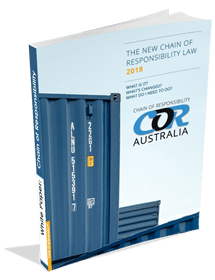CoR Provisions Introduced in Western Australia
In late April 2015, Chain of Responsibility legislation was introduced – a major milestone for WA road safety the state’s road authority highlighted.
The authority conducted a comprehensive communication campaign to ensure all industry members and stakeholders are aware of the implications of changes to existing legislation and so that they understand the effects on their business.
The national model Road Transport Reform (Compliance and Enforcement) Bill introduces the concept of ‘Chain of Responsibility’.
With the implementation of CoR legislation, everyone involved in the supply chain needs to understand the responsibilities they have while transporting goods on the road. This means everyone in the supply chain has a role to play in road safety, not just the driver and operator.
According to the WA road authority the main objectives of the national model bill are to:
- Improve road safety
- Reduce infrastructure damage
- Improve deterrence and enforcement;
- Promote a level playing field for industry; and
- Improve business efficiency and compliance.
Source: www.mainroads.wa.gov.au
For drivers the changes are minimal but for others in the chain it is significant. More people are now responsible along the chain and anyone involved in road transport activities, you are a party in the CoR and need to be aware of their obligations. You therefore may be deemed liable if there is a breach of the road laws.
People in the chain that may be deemed liable for breaches include those involved in:
• Consigning – a person or company commissioning the carrying of goods
• Packing – placing goods in packages, containers or pallets
• Loading – placing or restraining the load of the vehicle
• Driving – the physical act of driving a vehicle
• Operating/Managing – operating a business which controls the use of a vehicle
• Receiving – paying for the goods/taking possession of the load** Scheduler – whilst not a defined role in WA legislation, there are provisions to include duties performed by a scheduler.
Source: www.mainroads.wa.gov.au
Also the law extends to employers, company directors, unincorporated associations and partners in a managed partnership.
In other words anyone with authority in the transport chain can be held legally liable if they cause or contribute to a road safety breach, whether by their actions, inaction or demand.
With regards to Chain of Responsibility obligations, members of the supply chain need to ensure:
-
They had taken all reasonable steps to prevent a breach
-
There were no reasonable steps they could have taken to prevent the breach;
-
and there was no way they could reasonably be expected to know about the breach.
Source: www.mainroads.wa.gov.au


